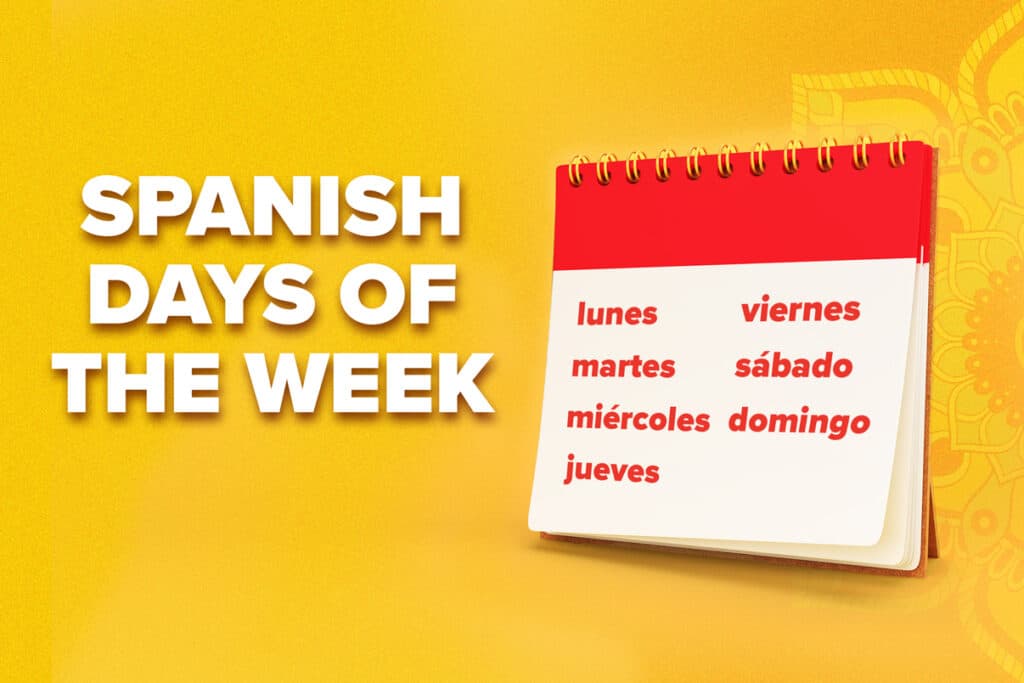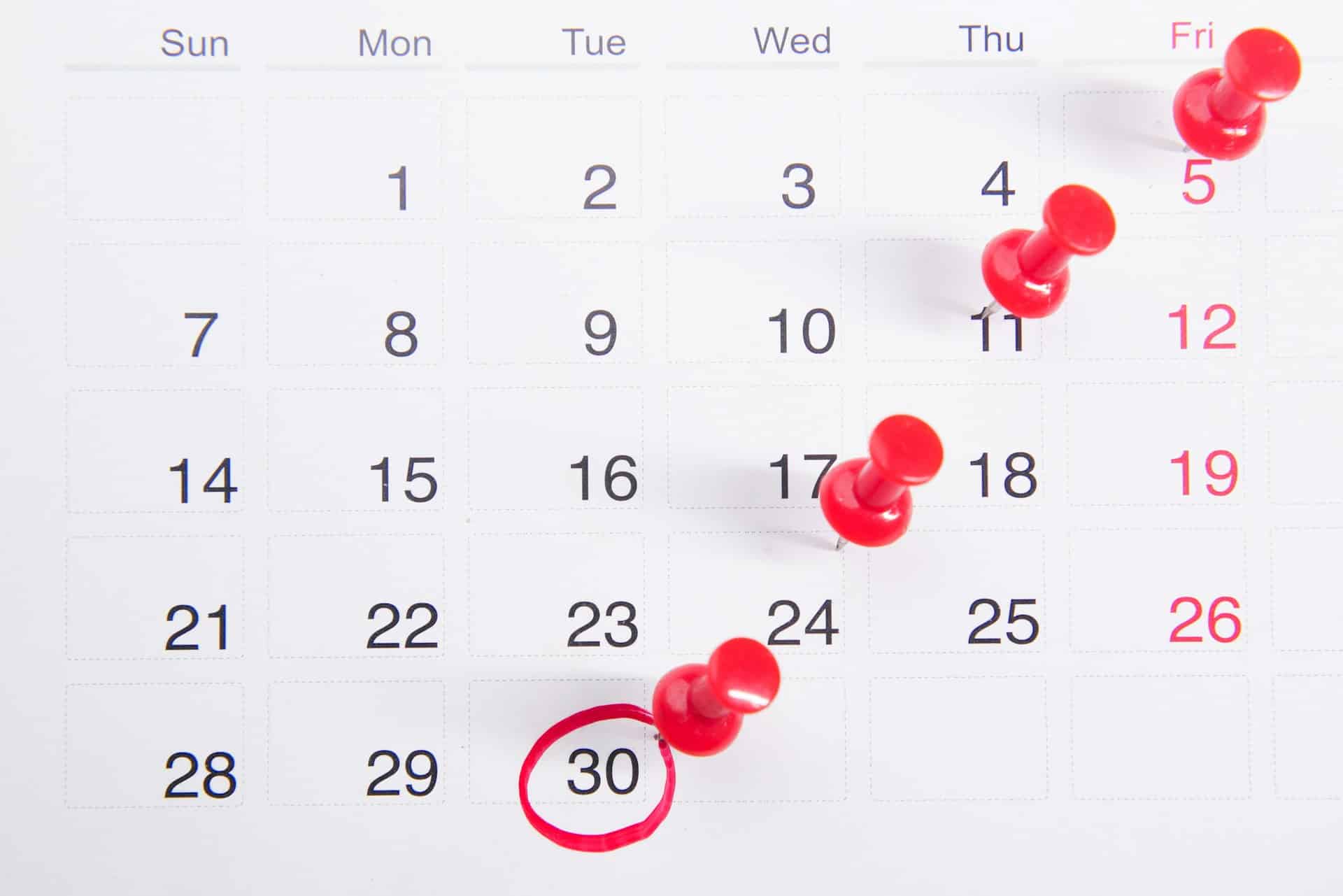
Mnemonics for Memorizing Spanish Days of the Week
Want to learn the seven Spanish days of the week, but keep mixing them up? Not to worry—memorizing the días de la semana is much easier than it sounds.
In this post, we’ll walk you through the days of the week in Spanish, how to memorize them and all of the other information you need to know to master them.
Contents
- What Are the Spanish Days of the Week?
- How to Memorize the Spanish Days of the Week
- Origins and Abbreviations of the Spanish Days of the Week
- Simple Rules for Using the Spanish Days of the Week
- Spanish Days of the Week Quiz
- And One More Thing…
Download: This blog post is available as a convenient and portable PDF that you can take anywhere. Click here to get a copy. (Download)
What Are the Spanish Days of the Week?
The Spanish days of the week are:
| Spanish | English |
|---|---|
| lunes | Monday |
| martes | Tuesday |
| miércoles | Wednesday |
| jueves | Thursday |
| viernes | Friday |
| sábado | Saturday |
| domingo | Sunday |
And here’s an infographic summarizing the pronunciation of each day of the week in Spanish:
How to Memorize the Spanish Days of the Week
Luckily, there’s a cute song on YouTube to help you remember the days of the week in Spanish. It’s aimed at children, but adult learners who like mnemonics and fun jingles can benefit from it, as well:
And here are the lyrics as they pertain to the Spanish days of the week:
Lunes
Remember how lunes was derived from luna (moon)? That’s a good way to remember the Spanish name for Monday.
Monday is “moon-day,” so you can immediately associate it with the Spanish word for the moon!
Martes
So what do you do if your Monday nearly drives you to lunes-y (see what I did there?) Why, you run to the nearest beach and dive into the sea ( mar ), of course! And you do it on a Tuesday or martes.
Just remember to bring all of your beach essentials!
Miércoles
This time, you’re having a mid-week slump. Luckily, your brother ( mi hermano ) is there to give you the first syllable miér-.
And how do you remember -coles? Well, you count stars ( cuento estrellas ), which should tide you over the mid-week slump in the meantime.
Jueves
The weekend is almost-but-not-quite-there! Since your hermano is no longer there to help you count stars, you now turn to your friends ( amigos ).
And what do you do with friends? You go play ( juego ) with them, which gives you jueves. By the way, juego is the present tense form of the infinitive jugar (to play).
Viernes
TGIF! Now that it’s almost the weekend, relatives have decided to come dropping by your house.
You can substitute tío Juan (Uncle Juan) with anyJuan (pun definitely intended). The important part here is the verb viene (come), the present tense form of the infinitive venir (to come). Once viernes rolls around, your relatives (or anyJuan else, really), will come to your house.
Sábado
What do you usually associate with Saturdays? Rest, or as they’d say in Hebrew, sabat (sabbath). Your rest day might involve going out ( salgo ) with your family—or any other fun activity, really.
Domingo
Of course, Sunday is also a day for resting. For Christians (which is most of the Spanish-speaking world), Sunday is also a day to spend time with the Lord—or, in Latin, dominus.
Think of how we sometimes append the abbreviation “A.D.” to the end of years. A.D. is short for anno domini or “in the year of the Lord.” Remember that Spanish is a Romance language, so it derives a lot of words from Latin, the lingua franca of the ancient Roman Empire (from which the term “Romance” comes from).
Here are a few more tips for memorizing the Spanish days of the week:
- Write the full date every day. Writing the full date daily will help you remember the words and their correct order.
- Make up an acronym. Use the first letter of each day and create your own acronym to help you remember them—for example, Little Mice Make Jolly Vikings Slam Doors. Yes, it’s silly, but that’s what makes it so memorable!
- Switch your phone to Spanish. Changing your settings to make your phone speak to you in Spanish can be a great way to practice your language skills throughout the day passively.
Origins and Abbreviations of the Spanish Days of the Week
Most of the Spanish days of the week were named according to their original Greek or Roman names, which in turn originated from spiritual figures.
You’ll see some Latin and Hebrew linguistic elements, too!
| English | Spanish | Abbreviations | Origin |
|---|---|---|---|
| Monday | lunes | L, LU or lun. | Luna (the moon) |
| Tuesday | martes | M, MA or mar. | Marte (Roman god of war) |
| Wednesday | miércoles | X, MI or miérc. | Mercurio (Roman god of commerce) |
| Thursday | jueves | J, JU or juev. | Júpiter (Roman god of the sky) |
| Friday | viernes | V, VI or vier. | Venus (Roman goddess of love) |
| Saturday | sábado | S, SA or sáb. | Sabat (Hebrew word for "rest," as in "sabbath") |
| Sunday | domingo | D, DO or dom. | Dominus (Latin word for "Lord") |
Here’s a YouTube video further discussing the Spanish days of the week, including their origins:
Simple Rules for Using the Spanish Days of the Week
The days of the week are not capitalized (with one exception)
Unlike English, Spanish does not capitalize the days of the week—unless they’re used at the start of a sentence.
| Spanish | English |
|---|---|
| El viernes pasado fuimos al cine. | Last Friday we went to the movies. |
| Lunes y martes son días ajetreados en la oficina. | Mondays and Tuesdays are busy days at the office. |
All days of the week use masculine articles
In Spanish, all nouns have a gender, including the days of the week. Luckily, all of these days are masculine, meaning that when you refer to them, you use the masculine articles el (singular definite article), los (plural definite article), un (singular indefinite article) or algunos (some).
| Spanish | English |
|---|---|
| El jueves es el día de mercado en mi pueblo. | Thursday is market day in my town. |
| Los viernes suelo salir a cenar con amigos. | On Fridays, I usually go out to dinner with friends. |
| Un sábado soleado es perfecto para ir a la playa. | A sunny Saturday is perfect for going to the beach. |
| Algunos domingos prefiero quedarme en casa y relajarme. | Some Sundays, I prefer to stay home and relax. |
“On [day]” doesn’t translate directly into Spanish
In English, we use the preposition “on” to talk about something happening on a specific day. But in Spanish, you don’t need to insert the word en —or any other preposition, for that matter!
When talking about days of the week, use the articles el and los to mean “on.” Use el when talking about a single occurrence and the plural los when talking about something that happens habitually.
| Spanish | English |
|---|---|
| Viene a Madrid el lunes. | She's coming to Madrid on Monday. |
| Trabaja todos los sábados. | He works every Saturday. |
Only sábado and domingo change in plural form
Sometimes, you need to talk about days of the week in the plural, like in the previous example ( todos los sábados ).
When making days of the week plural, only add an –s if the word doesn’t already end in –s. In other words, only add -s to sábado and domingo. Otherwise, the word stays the same in the plural form. So, the plural forms of the days are:
| Spanish | English |
|---|---|
| Los lunes | Mondays |
| Los martes | Tuesdays |
| Los miércoles | Wednesdays |
| Los jueves | Thursdays |
| Los viernes | Fridays |
| Los sábados | Saturdays |
| Los domingos | Sundays |
Use ser with days of the week
When talking about which day of the week it is, always use ser instead of estar. Take a look at some examples:
| Spanish | English |
|---|---|
| Hoy es martes. | Today is Tuesday. |
| El juego es el miércoles. | The game is on Wednesday. |
| Mi cumpleaños es el próximo viernes. | My birthday is next Friday. |
Now that you know the basics, here are some useful words and phrases you may want to use when discussing the week’s days.
| Spanish | English | Example |
|---|---|---|
| Hoy es... | Today is... | Hoy es lunes.
(Today is Monday.) |
| Mañana es... | Tomorrow is... | Mañana es martes.
(Tomorrow is Tuesday.) |
| Ayer fue... | Yesterday was... | Ayer fue domingo.
(Yesterday was Sunday.) |
| El día | The day | ¿Qué día es hoy?
(What day is today?) |
| La fecha | The date | ¿Cuál es la fecha de hoy?
(What is the date today?) |
| El próximo | Next | ¡El próximo lunes es mi cumpleaños!
(Next Monday is my birthday!) |
| Que viene | The upcoming... | Vamos a Barcelona el viernes que viene.
(We're going to Barcelona this upcoming Friday.) |
| Siguiente | The following... | No empieza el curso el próximo lunes, sino el lunes siguiente.
(The class doesn't begin next Monday, but rather, the following Monday.) |
| Pasado | Last | El sábado pasado, fuimos a la playa.
(Last Saturday, we went to the beach.) |
| Anterior | Previous | No la vi el viernes pasado, sino el viernes anterior.
(I didn't see her last Friday, but rather, the previous Friday.) |
| Antier
/ Anteayer | The day before yesterday | Hoy es jueves, antier fue martes.
(Today is Thursday, the day before yesterday was Tuesday.) |
| Pasado mañana | The day after tomorrow | Viene mañana y pasado mañana se va.
(He's coming tomorrow, and the day after tomorrow he leaves.) |
| La semana | The week | La semana tiene siete días.
(There are seven days in a week.) |
| El fin de semana | The weekend | Este fin de semana voy a ver a mis amigas.
(This weekend, I'm going to see my friends.) |
| Entre semana | Midweek | Viajo los fines de semana, pero me quedo en casa entre semana.
(I travel on the weekends, but I stay at home during the week.) |
| Cada...
/ Todos los... | Every | Cada jueves tengo clase de matemáticas.
/ Tengo clase de matemáticas todos los jueves. (I have math class every Thursday.) |
| El primer... del mes | The first __ of the month | Hay una fiesta el primer sábado de junio.
(There is a party on the first Saturday of June.) |
| De... a... | From __ to __ | Trabajo de lunes a viernes.
(I work from Monday to Friday.) |
| Desde... hasta... | From __ to __ | Estaré en Santo Domingo desde el lunes hasta el sábado.
(I'll be in Santo Domingo from Monday until Saturday.) |
Congratulations! You now have all the tools you need to talk about the Spanish days of the week.
You’ll be well on your way to having fluent Spanish conversations about the dreaded lunes or the anticipated sábado in no time.
Spanish Days of the Week Quiz
Okay, let’s see how much you’ve learned today with a quick quiz!













Download: This blog post is available as a convenient and portable PDF that you can take anywhere. Click here to get a copy. (Download)
And One More Thing…
If you've made it this far that means you probably enjoy learning Spanish with engaging material and will then love FluentU.
Other sites use scripted content. FluentU uses a natural approach that helps you ease into the Spanish language and culture over time. You’ll learn Spanish as it’s actually spoken by real people.
FluentU has a wide variety of videos, as you can see here:

FluentU brings native videos within reach with interactive transcripts. You can tap on any word to look it up instantly. Every definition has examples that have been written to help you understand how the word is used. If you see an interesting word you don’t know, you can add it to a vocab list.

Review a complete interactive transcript under the Dialogue tab, and find words and phrases listed under Vocab.

Learn all the vocabulary in any video with FluentU’s robust learning engine. Swipe left or right to see more examples of the word you’re on.

The best part is that FluentU keeps track of the vocabulary that you’re learning, and gives you extra practice with difficult words. It'll even remind you when it’s time to review what you’ve learned. Every learner has a truly personalized experience, even if they’re learning with the same video.
Start using the FluentU website on your computer or tablet or, better yet, download the FluentU app from the iTunes or Google Play store. Click here to take advantage of our current sale! (Expires at the end of this month.)







